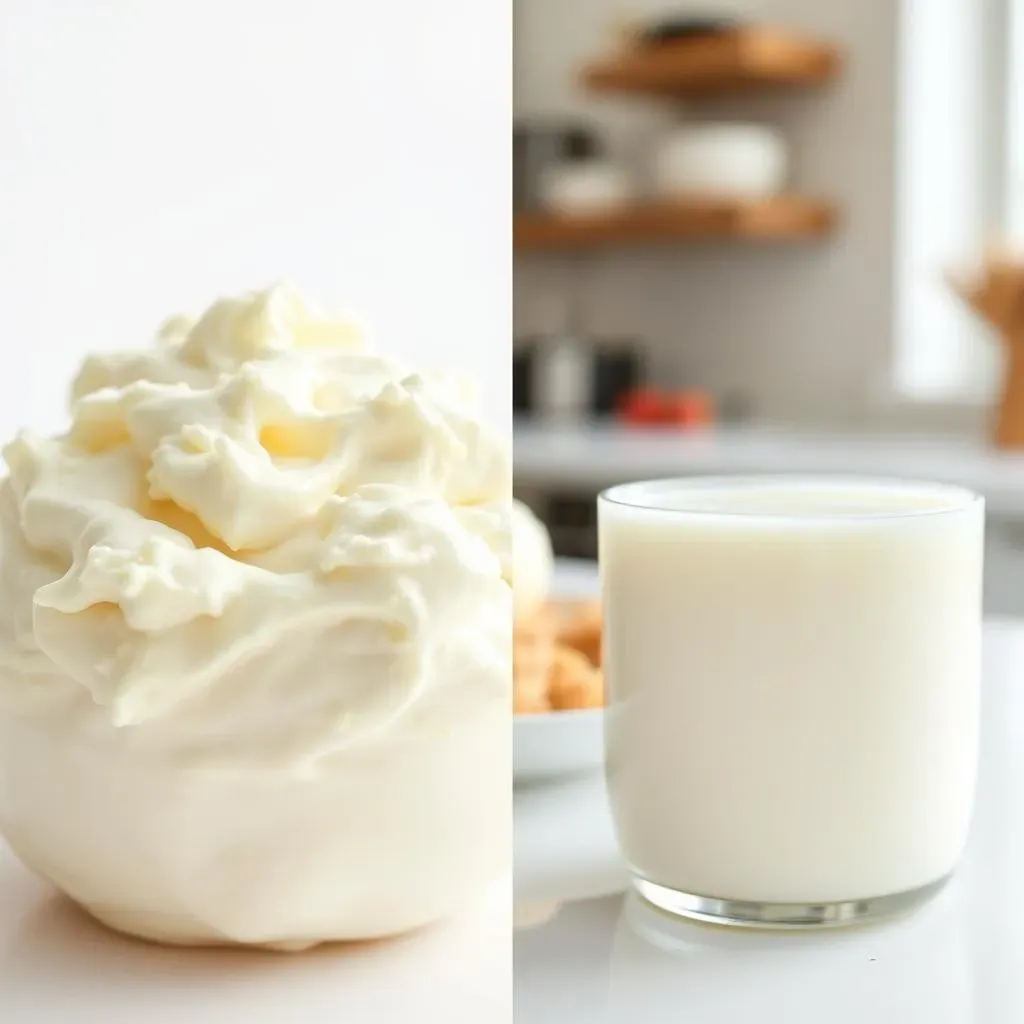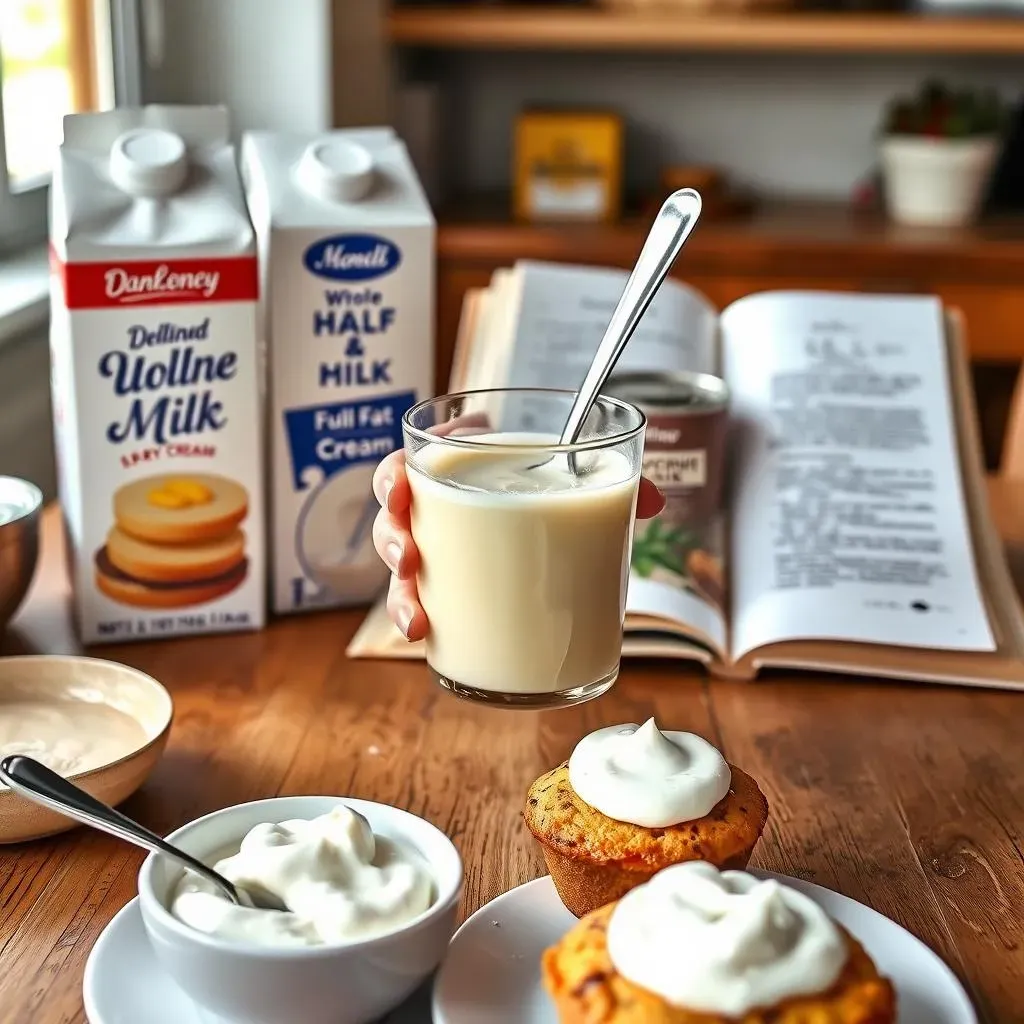Table of Contents
Ever stared blankly at a recipe, realizing you're missing a key ingredient—like evaporated milk—and the only thing you have on hand is sour cream? The question "can I substitute sour cream for evaporated milk?" pops into your head. This article cuts through the confusion. We'll explore the fundamental differences between sour cream and evaporated milk, explaining why a simple swap isn't always the best idea. We'll dive into the distinct properties of each, examining their fat content, texture, and how they behave when heated. You'll learn why sour cream's tangy, thicker consistency clashes with the creamy, thinner nature of evaporated milk, often leading to undesirable results in your baking or cooking. But don't worry, we won't leave you hanging! We'll provide you with a range of excellent alternatives to evaporated milk, perfectly suited for various recipes, and clarify when sour cream actually shines as a substitute in other contexts. Get ready to become a kitchen substitution expert!
Understanding Sour Cream and Evaporated Milk

Understanding Sour Cream and Evaporated Milk
Sour Cream: The Tangy Thickener
Let's start with sour cream. It's a fermented dairy product, meaning bacteria have worked their magic on cream, giving it that characteristic tangy flavor and thicker consistency. Think of it as cream that's had a bit of a party—a delicious, tangy party! The fat content varies, but it generally sits around 18-20%, contributing to its richness and creaminess. This high fat content also makes it a great addition to recipes where you want a rich, smooth texture, like in dips or as a topping for baked potatoes. Want to learn more about substituting sour cream in other recipes? Check out our guide on sour cream substitutes.
Sour cream's thickness comes from the fermentation process and the high fat content. It doesn't usually melt smoothly like milk-based products, and it can curdle if exposed to high heat. This is something crucial to remember when considering it as a substitute in recipes. For instance, using it in place of milk in a cake batter could result in a curdled, lumpy mess. If you're looking for alternatives to sour cream, you might find our guide on substituting heavy cream with sour cream helpful.
Property | Sour Cream |
|---|---|
Flavor | Tangy, slightly acidic |
Texture | Thick, creamy |
Fat Content | High (18-20%) |
Evaporated Milk: Concentrated Creaminess
Now, let's talk about evaporated milk. This isn't just regular milk that's been left out; it's regular milk with about 60% of its water removed through evaporation. This concentration process results in a richer, thicker liquid than regular milk, though still significantly thinner than sour cream. It has a milder, sweeter flavor than sour cream and can be used in both sweet and savory dishes. Because it's already concentrated, it often needs to be diluted with water or other liquids before being used in recipes. Want to know more about other substitutes for evaporated milk? Explore some options in our guide on sour cream for cream substitutions.
The key difference lies in its lack of fermentation. Evaporated milk maintains a relatively neutral flavor, making it adaptable to various recipes. While its thicker consistency than regular milk makes it useful in some situations, it still lacks the tang and body of sour cream. If you're trying to find a substitute for buttermilk in baking, you might be interested in our article on using sour cream for buttermilk.
- Concentrated cow's milk
- Milder, sweeter flavor
- Thinner than sour cream
Key Differences Summarized
In short, sour cream and evaporated milk are vastly different. Sour cream is a fermented dairy product with a tangy flavor and thick texture, while evaporated milk is concentrated cow's milk with a milder flavor and thinner consistency. Understanding these differences is crucial when considering substitutions in your recipes.
The next section will delve into why simply swapping one for the other is usually a bad idea, and what better alternatives you have for both sour cream and evaporated milk.
Why Sour Cream Isn't a Direct Swap for Evaporated Milk

Why Sour Cream Isn't a Direct Swap for Evaporated Milk
Texture Troubles: A Tale of Two Consistencies
Let's face it: sour cream and evaporated milk are like oil and water—they just don't mix well as direct substitutes. Sour cream's thick, almost pudding-like texture is worlds apart from evaporated milk's thinner, more liquid consistency. Imagine trying to use sour cream in a recipe that calls for the smooth, even consistency of evaporated milk in a creamy sauce or a light cake batter. The result? A lumpy, curdled mess that's far from appetizing. Need more ideas on using sour cream? Check out our guide on sour cream for mashed potatoes.
Think of it like this: evaporated milk is a blank canvas, easily blending into sauces and batters. Sour cream, on the other hand, is a bold statement piece—it's got personality! Its strong flavor and thick texture can easily overpower other ingredients. This makes it unsuitable for recipes where you need a subtle, creamy element. If you are looking for more sour cream substitutes, check out our guide on sour cream substitutes.
- Sour cream: Thick, tangy
- Evaporated milk: Thin, mild
- Incompatible textures for many recipes
Flavor Clash: Tang vs. Mild
Beyond texture, the flavor profiles are completely different. Sour cream boasts a distinct tangy, sometimes slightly acidic bite, thanks to its fermentation process. Evaporated milk, conversely, offers a mild, almost sweet flavor. Substituting sour cream for evaporated milk will introduce an unexpected sourness that may completely throw off the balance of your dish. This is especially true in recipes where the subtle sweetness of evaporated milk is crucial, such as some types of cakes or custards.
Think about a creamy mushroom sauce—evaporated milk adds a subtle creaminess without overpowering the delicate mushroom flavor. Now, imagine that same sauce made with sour cream. The tangy sour cream would clash with the earthy mushrooms, creating a strange and unpleasant flavor combination. For more ideas on dairy substitutions, check out our article on substituting heavy cream with sour cream.
Ingredient | Flavor Profile | Best Use Cases |
|---|---|---|
Sour Cream | Tangy, acidic | Dips, toppings, certain baked goods |
Evaporated Milk | Mild, slightly sweet | Sauces, custards, some baked goods |
Better Alternatives to Evaporated Milk and When to Use Sour Cream

Better Alternatives to Evaporated Milk and When to Use Sour Cream
Finding the Right Replacement for Evaporated Milk
So, you can't swap sour cream for evaporated milk. But what *can* you use instead of that evaporated milk? The best alternative depends heavily on your recipe. For creamy sauces or soups, whole milk (or even half-and-half for extra richness) thinned with a little water often works brilliantly. Need a thicker consistency? Try using heavy cream, but remember to adjust the amount accordingly since it's much richer. For baking, powdered milk reconstituted with water can be a great choice, offering similar properties to evaporated milk without the need for refrigeration. Check out our guide on heavy cream substitutes for more ideas.
For a completely dairy-free option, full-fat coconut milk can sometimes work, though it will impart a noticeable coconut flavor. This is ideal for recipes where that flavor complements the overall dish, such as curries or certain desserts. But remember, it's not a one-to-one replacement. You might need to adjust the amount based on the recipe and the coconut milk's thickness. If you're looking for a dairy-free alternative to sour cream, you might find our guide on plain yogurt substitutes useful.
- Whole milk (thinned with water)
- Half-and-half
- Heavy cream
- Powdered milk (reconstituted)
- Full-fat coconut milk (for coconut-flavored dishes)
When Sour Cream Truly Shines
While sour cream isn't a substitute for evaporated milk, it's a fantastic ingredient in its own right! Its tangy flavor and thick texture make it perfect for dips, toppings, and certain baked goods where that tanginess adds a delightful contrast. Think creamy dips for veggies, a dollop on top of chili, or even in some types of muffins or quick breads where its acidity helps balance sweetness and creates a tender crumb. For more ideas on using sour cream in baking, check out our article on sour cream for buttermilk.
Remember, the key is to choose ingredients that complement each other. Sour cream's bold flavor profile works best in recipes that can handle its intensity, whereas evaporated milk's neutrality makes it versatile for a wider range of culinary creations. If you're looking for a replacement for cream cheese, check out our guide on sour cream for cream cheese substitutes.
Recipe Type | Best Ingredient | Why? |
|---|---|---|
Creamy Sauce | Whole milk, half-and-half, or heavy cream | Provides smooth creaminess without overpowering flavors |
Cake Batter | Powdered milk (reconstituted) | Mimics the consistency and moisture of evaporated milk |
Savory Dip | Sour cream | Adds tangy flavor and thick texture |